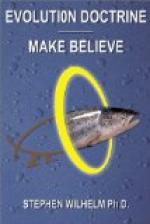Are the creatures of the living world so constituted that biological equivalents of these three essential elements of mechanical evolution can be found? Are organisms adapted to the circumstances controlling their lives, and are they capable of changing naturally from generation to generation, and of transmitting their qualities to their offspring? These are definite questions that bring us face to face with the fundamental problems relating to the dynamics or workings of evolution. We need not ask for or expect to find complete answers, for we know that it is impossible to obtain them. But we may expect to accomplish our immediate object, which is to see that evolution is natural. Our attention must be concentrated upon the three biological subjects of adaptation, variation, and inheritance, and we must learn why science describes them as real organic phenomena and the results of natural causes.
* * * * *
At the very outset, when the general characteristics of living things were considered, much was said on the subject of adaptation as a universal phenomenon of nature. It was not contended that perfection is attained by any living mechanism, but it was held that no place exists in nature for an organism that is incapable of adjusting itself to the manifold conditions of life. A modus vivendi must be established and some satisfactory degree of adaptation must be attained, or else an animal or a species must perish. With this fundamental point as a basis, we look to nature for two kinds of natural processes or factors, first, those which may originate variations as primary factors,—the counterparts of human ingenuity and invention in the case of locomotive evolution,—and the secondary factors of a preservative nature which will perpetuate the more adaptive organic changes produced by the first influences; it is clear that the latter are no less essential for evolution than the first causes for the appearance of variations.
The term “variation” is employed for the natural phenomenon of being or becoming different. It is an obvious fact that no child is ever exactly like either of its parents or like any one of its earlier ancestors; while furthermore in no case does an individual resemble perfectly another of its own generation or family. This departure from the parental condition, and the lack of agreement with others even of its closest blood-relatives, are two familiar forms of variation. As a rule, the degree to which a given organism is said to vary in a given character is most conveniently measured by the difference between its actual condition and the general average of its species, even though there is no such thing as a specimen of average nature in all of its qualities. In brief, then, variation means the existence of some differences between an individual and its parents, its fraternity, and, in a wider sense, all others of its species.




